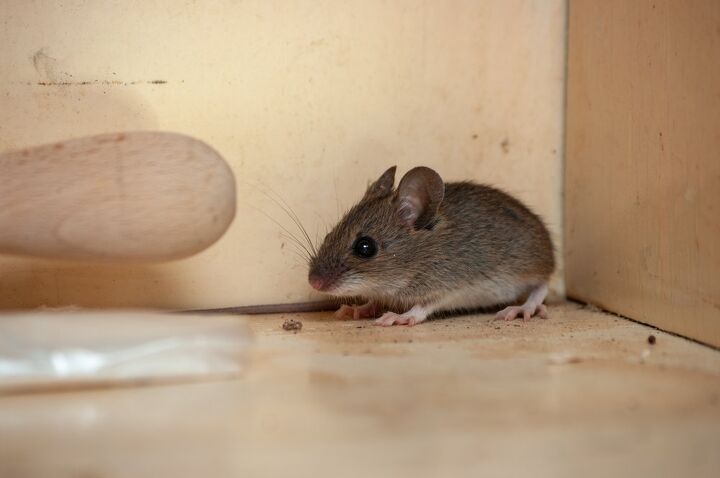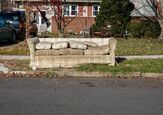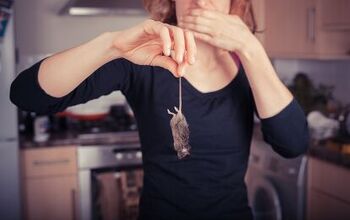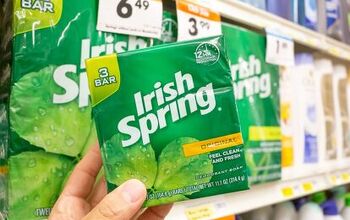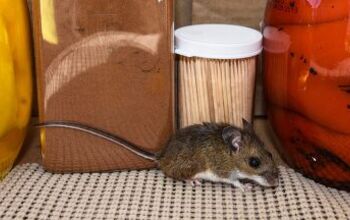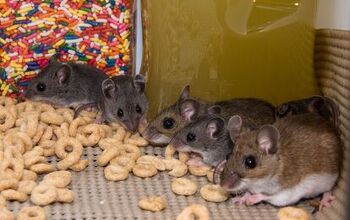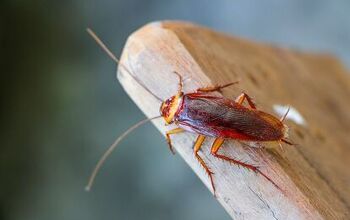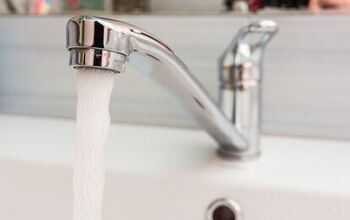Does Vinegar Repel Mice? (Find Out Now!)

If there was a household pest infestation you must take care of immediately, mice would top that list. These cunning, intelligent creatures can carry a host of viruses harmful to humans and are difficult to catch. What’s more, mice multiply quickly, so it’s tempting to reach for easy household items like vinegar to repel mice.
Mice are attracted to many items in your kitchen pantry, but vinegar certainly isn’t one of them. Along with some other household items, vinegar repels mice due mostly to its acerbic and acidic scent. Dousing cotton balls with vinegar and placing them along corners and crevices will deter mice from passing through.
Aside from vinegar, there are some common household items that you can use to quell the beginnings of an infestation. Before heading out to the store, read on and see what you may already have in your pantry. However, if your rodent infestation is considerably bad, you may have to leave the solution to the pest control pros.
Do You Need Pest Control Services?
Get free, zero-commitment quotes from pro contractors near you.

How Using Vinegar Repels Mice
Vinegar is one substance mice do not want anywhere around them. It doesn’t matter what kind of vinegar; apple cider, coconut, or white, mice will run away in the opposite direction. Some people advocate for a solution of half vinegar and half water, while others say ⅔ water to ⅓ vinegar.
Simply soak cotton balls with the vinegar solution and place them all over the areas where you suspect mice activity. Concentrate on the corners of your home, from the kitchen all the way to the back door. The smell of vinegar is key in driving mice away as far away from your home as possible.
Once you are done placing vinegar-soaked cotton balls all over your house, you can use the solution in other ways. Place the vinegar solution in a spray bottle and use this as a cleaning agent for your kitchen counters. Not only does it repel mice, but it also inhibits bacteria from growing in the first place.
Common Mice Repellents (Aside From Vinegar)
The smell of vinegar is not one you would wish to permeate your home. But the wonder of this acidic solution is that the vinegar smell never lingers long. However, there are other natural substances you may use if vinegar is not appealing to you.
Peppermint Oil
Peppermint oil is a fantastic substance to use when dealing with a mice infestation. Not only does peppermint oil smell heavenly to human noses, but it smells like hell to rodents. Be careful with this oil if you have pet dogs or cats, as it is harmful to them.
To use peppermint oil, douse cotton balls with the oil and place them in corners and crevices indoors or out. One problem with peppermint oil, however, is it diffuses rather quickly. Hence, you will need to repeat this process several times a day.
Another way to dispense the oil is to mix it with water and pour it into a spray bottle. Simply add 10-15 drops of the oil in water, shake the solution, and spray away. Again, the peppermint oil method only works if you are in a pet-free household.
Cinnamon
Cinnamon is yet another common pantry staple that can help you with your rodent problem. This spice’s heady, pungent aroma makes it truly unappealing to rodents and some other animals like squirrels and cats.
Keep mice infestation under control by sprinkling cinnamon powder in strategic nooks and crannies in the kitchen. Another way to use cinnamon is by grabbing a couple of sticks and stashing them in linen drawers and closets. Not only will this activity deter mice, but it will make your cupboards smell like autumn.
Tea Bags
If you are an avid tea drinker, then this rodent riddance hack is right up your alley. After enjoying your beverage, simply place your used tea bags along known mice pathways all around your home. The strong scent of the tea will have them running away from your home and not towards it.
One drawback of using tea bags is the tea leaves may stain baseboards, floors, or doors. Instead, place the used teabag in a small saucer to thwart this situation. This extra step will ensure that you don’t inadvertently create unsightly brown stains all over your home.
Ammonia
Ammonia, or smelling salts, is another rodent repellent you can use that you may already have in your medicine cabinet. Used as smelling salts, it causes irritation to your lung and nose membranes and forces you awake. When applying this method on mice, it is best used outdoors, as ammonia can be rather harsh even for humans.
To mice, ammonia smells of predators’ urine and will have them running to the hills and not towards your house. Their natural instincts deter them from coming back to places seemingly lurking with danger, such as households with cats. Simply ensure that you reapply it often as the scent does subside after a time.
Cayenne Pepper
Not only does cayenne pepper repel mice, but it also works on other household pests such as roaches, bugs, even raccoons. Capsaicin is the chemical found in cayenne pepper that causes that heat and burning upon ingestion. People also use cayenne pepper on garden plants prone to being eaten by a variety of pests.
Spread cayenne pepper all around your home, both indoors and outdoors, where you suspect mice frequent. Be careful with the use of cayenne pepper if you have household pets like dogs, cats, or birds. The capsaicin itself is non-toxic, but a small whiff can irritate your pets’ nasal passages.
Mint Toothpaste
Mint toothpaste not only keeps your breath fresh and your pearly whites gleaming, but it is also a fantastic mouse repellent. Mint products, like peppermint oil, keep mice at bay as that minty smell is something they just cannot take.
Grab a tube of mint toothpaste and spread it on baseboards, floors, doors, like you would with cinnamon or peppermint oil. No need to spend a lot of money on preventing a pest problem in the first place. It may be a little tedious, but remember to reapply regularly until all mice activity ceases.
Vinegar Repels Mice: But How Can You Prevent A Mice Infestation?
As old, wise pundits are fond of saying, “Prevention is better than cure.” This quote also applies to any pest problems you may have in your place of residence. Here are a few tips on ensuring that your home stays rodent-free not just today but also in the future.
Clean Up
Debris in and around your home is an invitation to mice and other pests like roaches. The best preventive measure against invading critters is keeping your home environment as clean as possible. Take kitchen trash out daily, sweep or vacuum kitchen floors, and do not leave dirty dishes in the sink.
Go through all the rooms in your house and lessen the amount of clutter, or better yet, get rid of it right away. Discard paper products such as old newspapers and outdated documents as these are tantalizing nesting materials for mice. Donate clothes and linens you don’t need instead of keeping them in closets which mice will determine as instant shelter.
Store Food In Plastic Or Glass Containers
If keeping food outside the fridge, replace cardboard packaging with lidded plastic or glass containers that mice can’t chew through. Cereal boxes are notorious mice attractants as well as any type of foodstuff in sacks or bags. Invest in durable plastic food containers or a nice set of mason jars to dissuade those tiny but sharp chompers.
Fix Holes, Cracks, and Crevices
You’d be surprised how one tiny crack can serve as the grand entrance to your home for a little mouse. Mice are exceptionally agile creatures and can streamline their bodies in holes as small as the circumference of a pen. Not only are they nimble contortionists, but they are also amazing climbers and jumpers.
Check every corner of your home from top to bottom, including window sills and under doors. If you find a small crack or crevice, fill it with caulk or expandable foam. Steel wool is yet another material you can use to stuff in holes since mice will not chew through metal.
Trim Surrounding Greenery
Mice have been known to enter houses and buildings by launching themselves off of overhanging tree branches or tall bushes. To prevent such an intrusion, you may need to do a bit of landscaping.
Check your home periphery and start surveying all the plants that surround your house. There should be at least two feet of space between your house and the greenery on your property. These would include all trees, bushes, and climbing plants, if present.
Do You Need Pest Control Services?
Get free, zero-commitment quotes from pro contractors near you.

Related Questions
Do mice pose a danger to human health?
Aside from possibly slowly eating you out of house and home, mice carry viruses that are harmful to your health. When mice decide to make your house their home, too, they will leave excrement to mark their territory. Mice droppings carry viruses like salmonella, hantavirus, and the treacherous lymphocytic choriomeningitis. This latter disease causes neurological disorders and can be fatal.Aside from wreaking havoc on human health, the presence of mice in your home may be a fire hazard. They will not operate the stove while you sleep, but rather, mice will chew off electrical wiring within your walls. Unfortunately, mice need to constantly chomp on anything to keep those sharp teeth in good working order. The best course of action is to ensure that not a single mouse enters your residence at all. It sounds overwhelming, but as long as you take preventive measures, it can be done.
Aside from mice, what other pests should I be aware of?
Mice do enough damage as it is, but you should be aware of other harmful pests like roaches and raccoons. The best preventative is to ensure there is no enticing food for unwanted pests to partake in. Most critters are drawn by the smell of food from the trash, open containers, and unclean kitchens. Avoid pests from even considering your home for shelter and sustenance by tackling your trash problem head-on. Keep trash bins tightly lidded and sweep away food scraps as soon as you finish preparing meals. Use natural pest deterrents such as vinegar or lemon juice as part of your cleaning implements.
Related Guide

Stacy Randall is a wife, mother, and freelance writer from NOLA that has always had a love for DIY projects, home organization, and making spaces beautiful. Together with her husband, she has been spending the last several years lovingly renovating her grandparent's former home, making it their own and learning a lot about life along the way.
More by Stacy Randall



